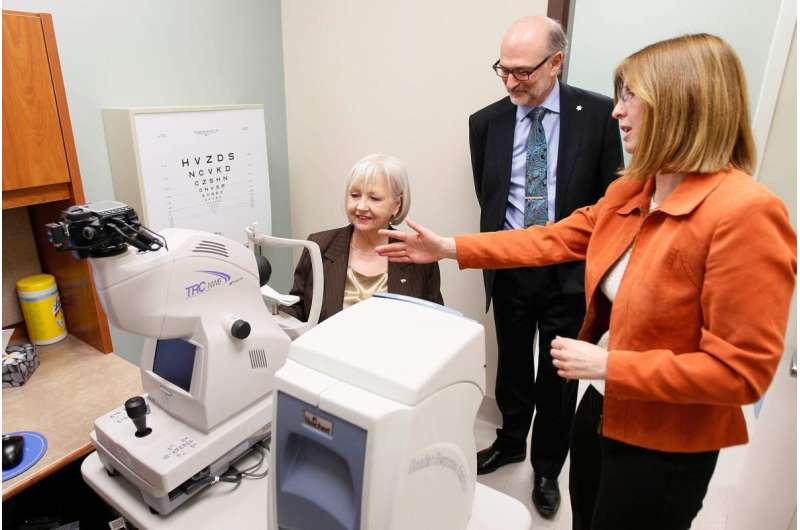Dr. Verena Menec, Dr. Harvey Chochinov, and former MP Joy Smith. Credit: University of Manitoba
How does a pandemic affect the physical and psychological health of adults as they age? Does COVID-19 have an impact on the delivery of regular health-care services? Does a COVID-19 infection lead to long-term health problems affecting the lungs or brain?
These are just a few of the questions a new study being led by the University of Manitoba's Dr. Verena Menec will answer.
The collaborative research project, conducted in partnership with more than 10 institutions across the country, will examine the experiences of older adults during the coronavirus pandemic, exploring how they cope, the impacts on their physical and mental health, and changes to how they access health-care services.
The COVID-19 study is being conducted by the Canadian Longitudinal Study on Aging (CLSA), a national research platform on health and aging led by Dr. Parminder Raina of McMaster University, and co-principal investigators Christina Wolfson of McGill University and Susan Kirkland of Dalhousie University, along with a national team of researchers.
The Manitoba lead, Verena Menec is a professor in the department of community health sciences at the Max Rady College of Medicine, Rady Faculty of Health Sciences and former Canada Research Chair in Healthy Aging.
The CLSA cohort of participants began with baseline data from over 50,000 women and men aged 45 to 85 years gathered from 2012 to 2015 across Canada.
"About 4,500 Manitobans participate in CLSA and are eligible to participate in this COVID-19 study," says Menec. "The original CLSA participants completed their first follow up in 2015 to 2018," says Menec. "The second follow-up for 2018 through 2021 is currently underway. Participants undergo repeated data collection every 3 years, and are followed for at least 20 years, ending in 2033."
Assessments include physiological and cognitive measures, psychosocial measures, health information and lifestyle and sociodemographic measures.
Menec commented, "We already have a lot of information about participants that can help us look at a wide range of important questions related to COVID-19. For example: What are the genetic determinants of how severe COVID-19 infection are? Have individuals modified their behaviors to reduce their risk of COVID-19 throughout the course of the pandemic? To what extent have COVID-19-social distancing policies led to economic hardships among adults unable to work during this time? And what are the short-term and longer-term impact of these hardships?"
Over the next six months, the CLSA COVID-19 study will collect weekly and monthly data from its participants through online and telephone surveys to gain a comprehensive picture of the spread and impact of the pandemic. In addition to data on health and well-being, the study will also gather information on health behaviors, such as social distancing and handwashing, workplace and economic impacts, as well as travel history.
For more information on the CLSA COVID-19 study, visit: clsa-elcv.ca/coronavirus
Provided by University of Manitoba
























